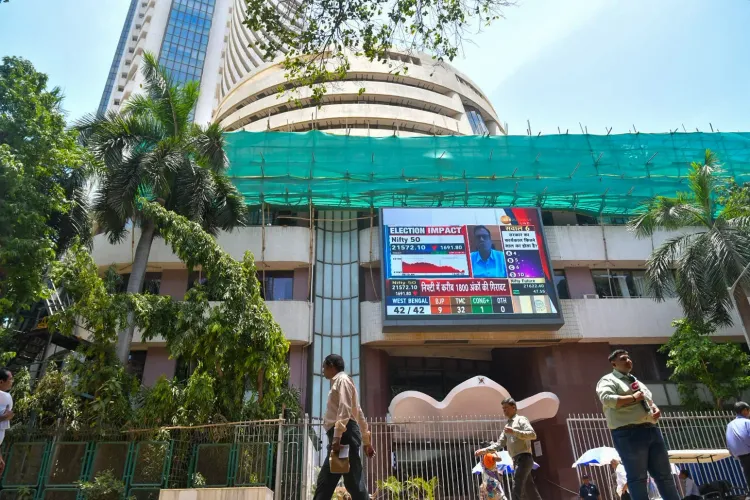Why Did the Stock Market Close Lower Ahead of Key Inflation Data?

Synopsis
Key Takeaways
- Sensex and Nifty closed lower due to inflation data concerns.
- Sectoral performance varied, with healthcare and automobile stocks gaining.
- Volatility persisted amid global tariff developments.
- Investors focused on domestic consumption-led sectors.
- Rupee remained steady but faced pressure from rising crude prices.
Mumbai, Aug 12 (NationPress) The Indian benchmark indices closed lower on Tuesday as investors remained cautious ahead of the release of July inflation data from both domestic and US sources, amidst worries regarding tariffs.
Sensex finished the day at 80,235.59, decreasing by 368.49 or 0.46 percent. The 30-share index commenced in the red at 80,508.51 compared to the previous closing of 80,604.08, as market participants awaited crucial inflation data. The index experienced significant volatility throughout the session.
Nifty concluded at 24,487.40, down by 97.65 points or 0.40 percent.
Among the major losers in the Sensex basket were Bajaj Finance, Trent, Hindustan Unilever, Eternal, HDFC Bank, Bajaj FinServ, Bel, ICICI Bank, Kotak Bank, and Reliance. Conversely, Maruti Suzuki, Tech Mahindra, Mahindra and Mahindra, NTPC, Sun Pharma, Tata Steel, and Titan posted gains.
Most sectoral indices encountered selling pressure during trading hours. Nifty Fin Services fell by 270 points or 1.02 percent, Nifty Bank decreased by 467.05 points or 0.84 percent, and Nifty FMCG ended 275 points or 0.50 percent lower. Nifty IT and Nifty Auto, however, finished in positive territory.
The broader indices had mixed performances, with Nifty Next 50 and Nifty Small Cap 100 closing flat, while Nifty Midcap 100 dipped by 154 points or 0.27 percent. Nifty 100 closed 86 points or 0.34 percent lower.
The national market reacted with volatility to ongoing developments in global trade tariffs, reflecting caution following the extension of the US–China tariff truce and ahead of key inflation data.
“Inflation figures from the US could reveal any tariff-related impacts that might affect the Fed’s policy. Domestically, inflation is expected to remain below the RBI's range. Sector-wise, healthcare and automobile stocks saw gains, while financials and real estate dragged down the index. In the short term, stock-specific movements are likely to continue as investors focus on sectors driven by domestic consumption to navigate through volatility,” stated Vinod Nair, Head of Research at Geojit Investments Limited.
Meanwhile, the rupee traded flat near 87.70 as the dollar index hovered around 98.30 with a slightly positive bias. Elevated crude prices exerted pressure on the rupee, while traders awaited US CPI data for fresh insights, according to experts.









